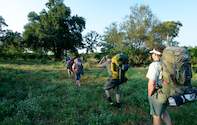
Wilderness walks or trails are today nothing new. But almost thirty years ago, in 1978, this was a novelty that appealed to every wildlife enthusiast and which satisfied an intense longing in visitors to the Kruger Park; to be able to walk in the bush instead of seeing it all from inside a hot and cramped motor vehicle. Being deeply involved in the Wild Life Society at the time it was my good luck to be invited to take part in what I remember as the second of these wilderness experiences in the Park; there had been the first one shortly before which I had missed for some reason or other.
There was then only one trail in the Park, the Wolhuter Trail in the southern part. We gathered at Skukuza. There was Derek Fulton, a stalwart of the Land Utilisation Committee of the Society and one of the first of the participants in the Fauresmith Endurance Race. Another was Kosta Babich, originator of the Working Group of the Society assisting in the Parks. He had the unfortunate experience of being treed by somelions while doing a game count at the Kamqua waterhole in the Gemsbok Park.
The wife of Tony Bannister, nature photographer of special talent added some class to the rough male gathering. The ranger in charge of the trail was Trevor Dearlove also then quite new at the game. His assistant was John Mangane, known as Japie, to distinguish him from all the other Johns, and, like Trevor lean and fit and armed for our protection. On the previous, the first trail, Trevor had been forced to fire several shots to turn a rhino which was charging the group around.
While travelling to the camp site in a Park vehicle along a 'No entry' road (where you are convinced the game is skulking down there) some bird of prey, an eagle swooped down and picked a puffadder off the road. A thrill for everyone. The trail camp was beyond Stoltznek Dam. The ranger in this area was Mike English who had an abiding interest in Bushman paintings. He joined the trail on one day and pointed out several places where the paintings, although exposed and weathered could still be seen.
Showers at the camp were elementary but practical; there were beds but we hauled them out of the tents and slept under the stars. After a day's walking there were no insomniacs. Not quite every night. The second afternoon we had been at Stoltznek Dam in the twilight, listening to the roaring lions all round. There was some worry in case they should decide to come into the camp in the night. But every 'trailer', that is, the men, had provided a good supply of beer against the hot days, and by bedtime the lions were forgotten.
Just a few short days on the trail and among people of shared interests this is really not enough; the memories, however, stay with you. You remember hot days in the bush, struggling through long grass or thorn bushes, climbing down rocks to a dry riverbed and up the other side. And all a thrill to even the tired ones. It ends too quickly. But I owe Trevor. No matter where we walked or rested there was this birdcall that he loved. I found out later that this was the melody sung by the Blackcrowned Tchagra, a shrike. The sound has never left me and when I hear it now it floods me with nostalgia. Oh, to be in the Park with the sun on my head and the birdsong filling my ears. Never mind the scratching thorns and grass seed in your socks!
Experience a walking safari in Kruger National Park
By John Parsons

